-
ORIGINAL ARTICLE08-07-2023
Perception of Portuguese nurses: clinical supervision and quality indicators in nursing care
Revista Brasileira de Enfermagem. 2023;76(3):e20220656
Abstract
ORIGINAL ARTICLEPerception of Portuguese nurses: clinical supervision and quality indicators in nursing care
Revista Brasileira de Enfermagem. 2023;76(3):e20220656
DOI 10.1590/0034-7167-2022-0656
Views0See moreABSTRACT
Objectives:
to describe nurses’ perception of the influence of clinical supervision on improving quality indicators in nursing care.
Methods:
exploratory research with a qualitative approach, carried out with 16 nurses using the focus group. Data processing emerged from lexicographical textual analysis, resorting to Descending Hierarchical Classification and similarity analysis.
Results:
80.0% retention of 185 text segments with six-class construction. The words were represented by four graphs (supervisor, audit, care, and process); and three subgraphs (implementation, sharing and knowledge).
Final Considerations:
in the perception of nurses, supervision influences quality indicators in nursing care.
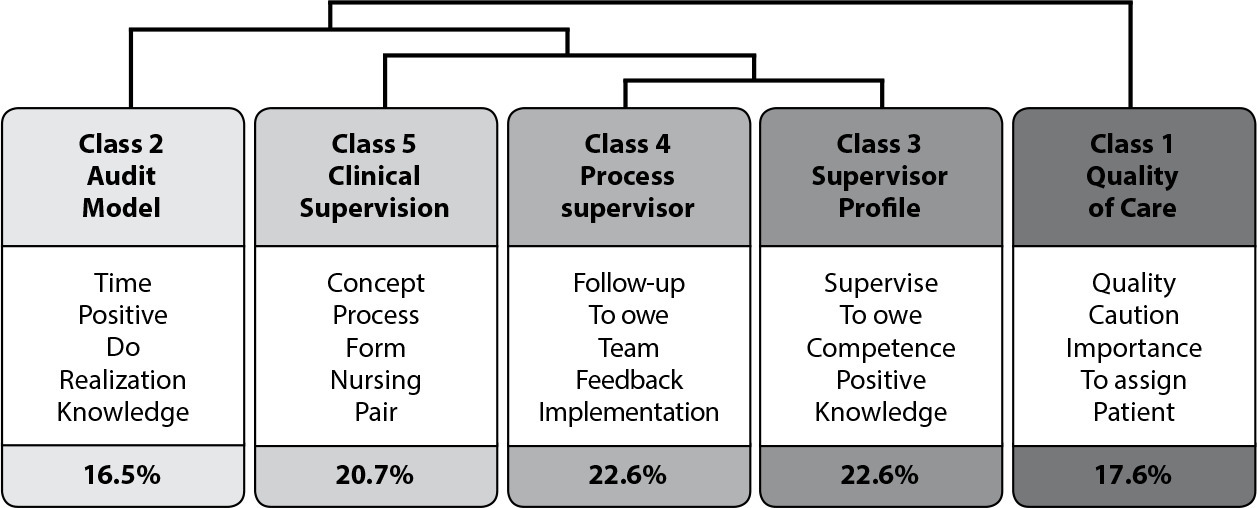
-
REVIEW08-07-2023
Early diagnosis of HIV/aids infection: concept analysis
Revista Brasileira de Enfermagem. 2023;76(3):e20220565
Abstract
REVIEWEarly diagnosis of HIV/aids infection: concept analysis
Revista Brasileira de Enfermagem. 2023;76(3):e20220565
DOI 10.1590/0034-7167-2022-0565
Views0ABSTRACT
Objectives:
to analyze the concept of “early diagnosis of HIV/Aids infection” in light of Walker and Avant’s conceptual analysis model.
Methods:
concept analysis study based on the framework proposed by Walker and Avant, instrumented by a scoping review conducted in April 2022, following the recommendations of the Joanna Briggs Institute and checklist Preferred Reporting Items for Systematic reviews and Meta-Analyses extension for Scoping Reviews. The search was made in eight data sources, obtaining sixteen articles.
Results:
the study found homosexual intercourses, early examination, anti-HIV antibodies, CD4 count, and sexually transmitted infection as the main attributes of the concept. As antecedents: information, risky behavior, unprotected sexual relations, prevention, and access to the service. As main consequences: antiretroviral treatment, seroconversion, transmission, and consultations.
Final Considerations:
the study approached the circumstantial situations of the theme, its attributes, antecedents, and consequences, qualifying the work process based on knowledge of nursing practice.
Keywords:Acquired Immunodeficiency SyndromeAIDS SerodiagnosisEarly DiagnosisHIV InfectionsHospital UnitsSee more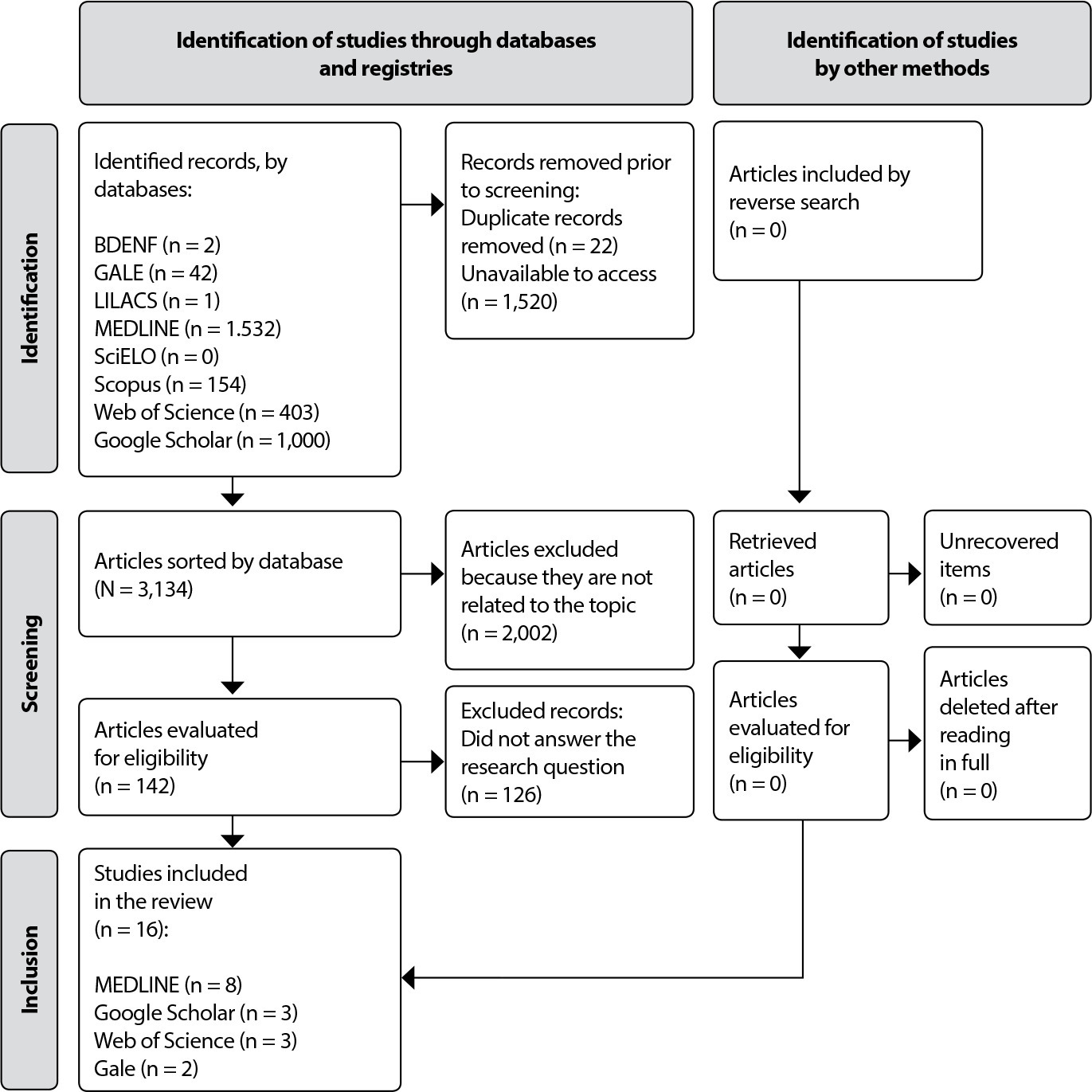
-
ORIGINAL ARTICLE08-07-2023
Workload assessment: cross-cultural adaptation, content validity and instrument reliability
Revista Brasileira de Enfermagem. 2023;76(3):e20220556
Abstract
ORIGINAL ARTICLEWorkload assessment: cross-cultural adaptation, content validity and instrument reliability
Revista Brasileira de Enfermagem. 2023;76(3):e20220556
DOI 10.1590/0034-7167-2022-0556
Views0See moreABSTRACT
Objectives:
to adapt, validate the content and assess the reliability of the instrument National Aeronautics and Space Administration – Task Load Index, translated into Brazilian Portuguese.
Methods:
a methodological study, divided into five steps: translation; synthesis; back-translation; assessment of the Portuguese version by an expert committee; pre-test and content validity of the final version by health professionals working in inpatient units. The Content Validity Index (CVI) (minimum 0.80) and Cronbach’s alpha (minimum 0.70) were calculated.
Results:
in the first round, in the agreement analysis of the translated version, three items did not reach the minimum CVI value. It was decided to remove the statement. The instrument title and items “performance” and “effort” were changed. There was consensus and approval of the final version in the pre-test step.
Conclusions:
the NASA Task Load Index instrument, adapted to Brazilian Portuguese, presents reliability and content validity evidence.
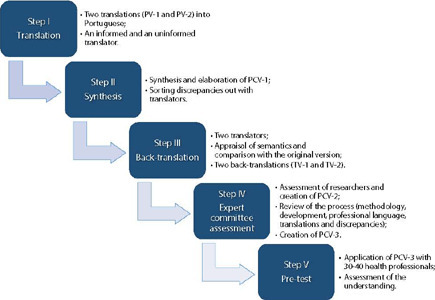
-
REVIEW08-07-2023
Instruments for assessing foot self-care of people with diabetes: a scoping review
Revista Brasileira de Enfermagem. 2023;76(3):e20220555
Abstract
REVIEWInstruments for assessing foot self-care of people with diabetes: a scoping review
Revista Brasileira de Enfermagem. 2023;76(3):e20220555
DOI 10.1590/0034-7167-2022-0555
Views0See moreABSTRACT
Objectives:
to map, in the world literature, instruments for assessing foot self-care of people with diabetes.
Methods:
a scoping review in Scopus by Elsevier, MEDLINE via PubMed, LILACS, SciELO databases and gray literature, using the controlled words diabetic foot, self care, questionnaire. Search was carried out in February and March 2021, according to JBI recommendations and PRISMA-ScR extension.
Results:
fifteen studies made up the review, 14 articles and one thesis, published between 2000 and 2020. 16 instruments were identified: five with an emphasis on general self-care and 11 on foot self-care. Inspection, hygiene, washing and drying between the toes, lotion application and use of proper shoes and socks were the main self-care measures presented.
Final Considerations:
foot self-care is assessed by knowledge, social support and frequency with which measures are being put into practice, encouraging professional practice.
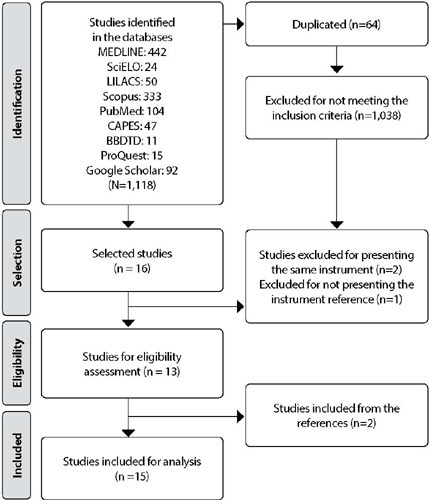
-
ORIGINAL ARTICLE08-07-2023
“Educational Material on HIV”: validity of health educational technology for people living with HIV
Revista Brasileira de Enfermagem. 2023;76(3):e20220549
Abstract
ORIGINAL ARTICLE“Educational Material on HIV”: validity of health educational technology for people living with HIV
Revista Brasileira de Enfermagem. 2023;76(3):e20220549
DOI 10.1590/0034-7167-2022-0549
Views0ABSTRACT
Objectives:
to validate the educational technology “Educational Material on HIV” (INPI – BR 10 2020 003765 0).
Methods:
a methodological study with 39 expert judges in HIV/AIDS, using a 5-point Likert scale for assessment. Data were tabulated, processed and analyzed through descriptive analysis. Cronbach’s alpha and McDonald’s omega tests were performed to analyze internal consistency, and the Intraclass Correlation Coefficient, for reliability. Agreement was established by a Level Content Validity Index greater than 0.90.
Results:
the assessment instrument showed high internal consistency (Cronbach’s alpha of 0.89; McDonald’s omega of 0.91) with reliable values. Based on the Intraclass Correlation Coefficient, judges’ answers showed acceptable reliability, mean score 0.89 (p<0.001). Agreement among judges was greater than 0.90 in the three assessed dimensions (objectives, presentation and relevance).
Conclusions:
the technology was considered a qualified and adequate tool by the judges regarding its objectives, presentation and relevance.
Keywords:Acquired Immunodeficiency SyndromeEducational TechnologyHealth EducationHIVValidation StudySee more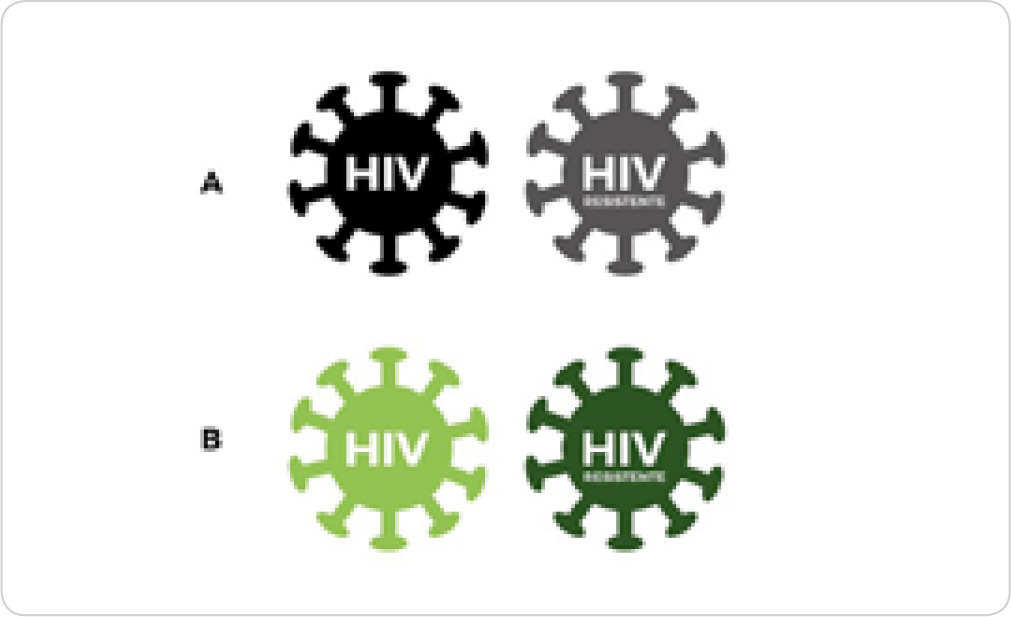
-
ORIGINAL ARTICLE08-07-2023
Content validity of the Post-Stroke Guidance and Follow-up Booklet
Revista Brasileira de Enfermagem. 2023;76(3):e20220532
Abstract
ORIGINAL ARTICLEContent validity of the Post-Stroke Guidance and Follow-up Booklet
Revista Brasileira de Enfermagem. 2023;76(3):e20220532
DOI 10.1590/0034-7167-2022-0532
Views0See moreABSTRACT
Objectives:
to provide sources of content validity evidence for the Post-Stroke Guidance and Follow-up Booklet.
Methods:
a quantitative-qualitative approach, using two Delphi method and content analysis rounds. The Educational Content Validation Instrument in Health was sent to 53 independent judges. A Content Validity Index above 0.90 was considered.
Results:
of the 14 nurses who participated, 64.3% have experience with stroke care, 35.7% with primary care and 64.3% with educational material production. In content analysis, judges’ suggestions were stratified into four categories: material conformation, objectivity, accuracy and perception. Spelling changes were made to the images, addition of functionality scale, adequacy of technical terms and language. The Content Validity Index in the second round showed a concordance of 0.97.
Conclusions:
the booklet presented satisfactory content validity sources of evidence.
-
ORIGINAL ARTICLE08-07-2023
Construction and validity of the Interprofessional Communication in Health Scale
Revista Brasileira de Enfermagem. 2023;76(3):e20220483
Abstract
ORIGINAL ARTICLEConstruction and validity of the Interprofessional Communication in Health Scale
Revista Brasileira de Enfermagem. 2023;76(3):e20220483
DOI 10.1590/0034-7167-2022-0483
Views0See moreABSTRACT
Objectives:
to construct and validate the Interprofessional Communication Scale in Health.
Methods:
a psychometric study was carried out on a sample of 360 nurses from a hospital and university center in central Portugal. Reliability was assessed through internal consistency and construct validity through exploratory and confirmatory factor analysis.
Results:
the Interprofessional Communication in Health Scale, consisting of 27 items, is organized into 3 factors: “Teamwork”, “Conflict management” and “Leadership”, with a total variance of 51.1%. Good internal consistency was obtained, with a Cronbach’s alpha of 0.842, and adequate Goodness of Fit Index model.
Conclusions:
the Interprofessional Communication in Health Scale presents a factorial structure with adequate validity and reliability results, and may constitute a useful self-report instrument in assessing interprofessional communication in health.
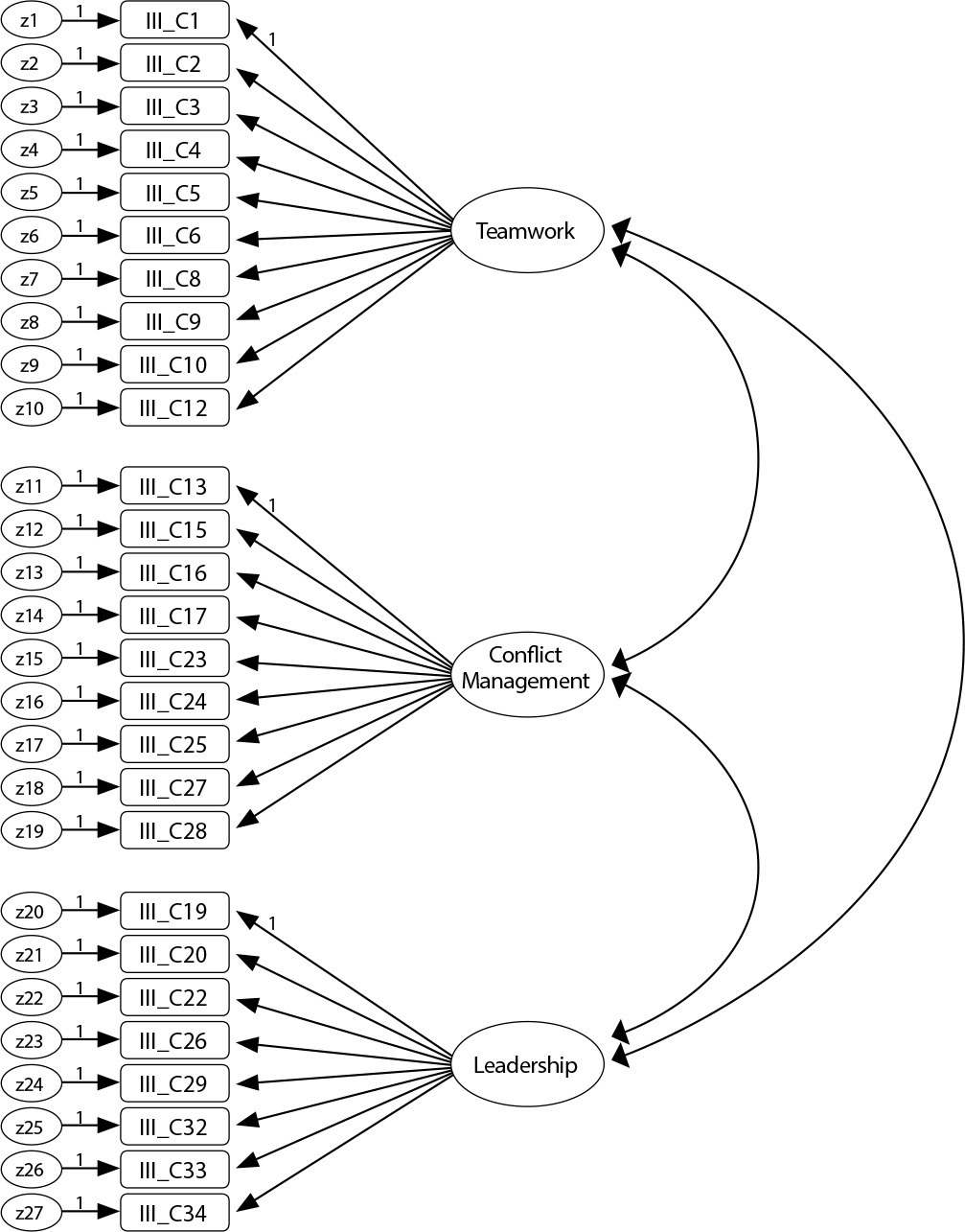
-
ORIGINAL ARTICLE08-07-2023
Systematization of Nursing Care: how did the concept mature?
Revista Brasileira de Enfermagem. 2023;76(3):e20220464
Abstract
ORIGINAL ARTICLESystematization of Nursing Care: how did the concept mature?
Revista Brasileira de Enfermagem. 2023;76(3):e20220464
DOI 10.1590/0034-7167-2022-0464
Views0See moreABSTRACT
Objectives:
to analyze the Systematization of Nursing Care conceptual maturation from the perspective of pragmatic utility.
Methods:
a concept analysis study. The stages were: select the concept; elaborate analytical questions; comprehensively review the literature; and determine concept structural components. Sixty-one documents were analyzed after a search carried out until October 2019.
Results:
four temporal periods of contextual changes have occurred since the emergence of ideas of a systematization in the 1960s. This first lasted until 1990. It was followed by those from 1990 to 2002, from 2002 to 2009 and from 2009 onwards. Partial conceptual maturity was identified, operationalization over the years, based on multiple definitions, and, currently, a concept of Systematization of Nursing Care with managerial and organizational attributes.
Conclusions:
the concept of Systematization of Nursing Care is partially mature, presents multiple definitions, being operationalized in uncertain connections with other concepts.
-
EDITORIAL01-01-2016
Discoveries of Biological Sciences and their implications for nursing practice
Revista Brasileira de Enfermagem. 2016;69(4):619-620
Abstract
EDITORIALDiscoveries of Biological Sciences and their implications for nursing practice
Revista Brasileira de Enfermagem. 2016;69(4):619-620
DOI 10.1590/0034-7167.2016690401i
Views1For the longest time, the production of knowledge in the field of biological sciences was viewed as the exclusive responsibility and competence of medical professionals. This scenario has changed in light of the worldwide trend of improvements in other health professions, which includes the need to implement the use of evidence-based methodology in nursing practice. […]See more -
EDITORIAL01-01-2016
Descobertas das Ciências Biológicas e as implicações para a prática da Enfermagem
Revista Brasileira de Enfermagem. 2016;69(4):619-620
Abstract
EDITORIALDescobertas das Ciências Biológicas e as implicações para a prática da Enfermagem
Revista Brasileira de Enfermagem. 2016;69(4):619-620
DOI 10.1590/0034-7167.2016690401i
Views0A produção de conhecimento na área das ciências biológicas, durante muito tempo, foi vista como de responsabilidade e competência exclusivamente de profissionais médicos. Esse cenário alterou-se frente à tendência mundial de aperfeiçoamento dos demais profissionais de saúde, incluindo-se a necessidade de se concretizar a utilização da metodologia da prática baseada em evidência na atuação do […]See more -
REVIEW01-01-2016
Effects from acupuncture in treating anxiety: integrative review
Revista Brasileira de Enfermagem. 2016;69(3):602-609
Abstract
REVIEWEffects from acupuncture in treating anxiety: integrative review
Revista Brasileira de Enfermagem. 2016;69(3):602-609
DOI 10.1590/0034-7167.2016690325i
Views0See moreABSTRACT
Objective:
to evaluate the scientific evidence that is available in the literature on the effects of acupuncture for treating anxiety and on the quality of such studies.
Method:
the study is an integrative review of CINAHL, LILACS, PUBMED-PICO, SciELO, and The Cochrane Library between 2001 and 2014. Keywords anxiety, acupuncture therapy, acupuncture, and anxiety disorders were combined among themselves to ensure a wide search of primary studies.
Results:
among 514 articles, 67 were selected to be fully read and 19 were included. Among these, 11 were found to have strong evidence levels. Among the six articles about randomized clinical studies, five were found to be of reasonable quality. Two studies used acupuncturist nurses to perform their interventions. Its results showed positive and statistically significant effects from using acupuncture for treating subjects with anxiety.
Conclusion:
acupuncture seems to be a promising treatment for anxiety; however, there is a need for improving the methodological quality of the research on this field.
-
REVIEW01-01-2016
Palliative care and spirituality: an integrative literature review
Revista Brasileira de Enfermagem. 2016;69(3):591-601
Abstract
REVIEWPalliative care and spirituality: an integrative literature review
Revista Brasileira de Enfermagem. 2016;69(3):591-601
DOI 10.1590/0034-7167.2016690324i
Views0See moreABSTRACT
Objective:
to analyze scientifi c articles published in international online journals about palliative care and spirituality.
Methods:
an integrative literature review with data collected in September 2014 from the LILACS, SCIELO, MEDLINE/PubMed, and IBECS databases.
Results:
thirty-nine publications were identifi ed and their textual analysis facilitated through four thematic approaches: the meaning of spirituality in the context of palliative care; palliative care and spiritual support; spirituality and relief of pain and other symptoms in patients under palliative care; and instruments to evaluate the spiritual dimension of the scope of palliative care.
Conclusion:
this study examined the relevance of the spiritual dimension in the care of patients with palliative care and the need for developing new studies to disseminate knowledge about this topic.
Descriptors:
Palliative Care; Palliative Care at End of Live; Spirituality; Religion; Health.
-
REVIEW01-01-2016
Educational technologies to encourage (self) care in postpartum women
Revista Brasileira de Enfermagem. 2016;69(3):582-590
Abstract
REVIEWEducational technologies to encourage (self) care in postpartum women
Revista Brasileira de Enfermagem. 2016;69(3):582-590
DOI 10.1590/0034-7167.2016690323i
Views0See moreABSTRACT
Objective:
to evaluate national and international literature regarding the use of educational technologies to encourage self care in postpartum women.
Method:
an integrative review of the literature. The articles were collected from the CINAHL, SCOPUS, PubMed, SciELO, LILACS and Cochrane databases; the time period for the articles referred to January/2004 to July/2014; the languages used in the articles were Portuguese, English, Spanish and French; the articles were selected from the following descriptors: postpartum care period, educational technology, nursing and self care. Twenty-seven articles were selected for analysis
Results:
based on the information found, the scales, counseling and home visits were among the most recommended educational technologies.
Conclusion:
the technologies promote communication, but are sometimes dependent on computer and internet access, which hinder their use by low-income women.

-
RESEARCH01-01-2016
Patients with HIV/Aids and ulcer risk: nursing care demands
Revista Brasileira de Enfermagem. 2016;69(3):574-581
Abstract
RESEARCHPatients with HIV/Aids and ulcer risk: nursing care demands
Revista Brasileira de Enfermagem. 2016;69(3):574-581
DOI 10.1590/0034-7167.2016690322i
Views0See moreABSTRACT
Objective:
to analyze the demand for nursing care and the risk of pressure ulcers (PU) of patients with HIV/Aids.
Method:
quantitative survey, carried out from December 2012 to March 2013 in a public hospital of Teresina, state of Piauí, Brazil.
Results:
the sample of 31 patients was predominantly male, mean age 36.6 years, average care demand 49.4%, most showing some risk of developing PU. The variables correlated with PU risk were care demand and clinical outcome (death). Those associated with care demand were age and clinical outcome (death).
Conclusion:
the results showed that patients require moderate nursing care needs and most of them present risk of developing PU.

-
ORIGINAL ARTICLE12-13-2024
Nurses’ experience regarding patient safety in mobile pre-hospital care
Revista Brasileira de Enfermagem. 2024;77(5):e20230529
Abstract
ORIGINAL ARTICLENurses’ experience regarding patient safety in mobile pre-hospital care
Revista Brasileira de Enfermagem. 2024;77(5):e20230529
DOI 10.1590/0034-7167-2023-0529
Views0See moreABSTRACT
Objectives:
to understand nurses’ experience regarding patient safety in mobile pre-hospital care.
Method:
a qualitative, exploratory and descriptive study, conducted with nurses active in mobile pre-hospital care services. Semi-structured interviews were conducted, audio-graved and submitted to Bardin’s content analysis.
Results:
from four thematic categories established, nurses reported the care and management skills necessary to work in this service. They demonstrated a commitment to ensuring safe care for patients, staff and spectators. They highlighted the actions taken to prevent and mitigate incidents. However, they based their experiences on practice protocols and individual actions, expressing the need to improve knowledge about patient safety.
Final Considerations:
mobile pre-hospital care nurses’ experience in relation to patient safety was limited, suggesting the need for training on the subject, alignment of work processes and implementation of strategies, aiming to guarantee safe care.
-
ORIGINAL ARTICLE12-13-2024
Repercussions of the pandemic on tuberculosis control actions from the perspective of health professionals
Revista Brasileira de Enfermagem. 2024;77(5):e20230477
Abstract
ORIGINAL ARTICLERepercussions of the pandemic on tuberculosis control actions from the perspective of health professionals
Revista Brasileira de Enfermagem. 2024;77(5):e20230477
DOI 10.1590/0034-7167-2023-0477
Views0See moreABSTRACT
Objectives:
to analyze the repercussions of the COVID-19 pandemic on tuberculosis control actions from the perspective of primary health care professionals.
Methods:
this descriptive study with a qualitative approach was conducted from November 2022 to April 2023, using semi-structured interviews with 11 key informant professionals from primary health care units in a Brazilian capital. Data were organized using Atlas.ti 22.0 software and subjected to thematic-categorical content analysis.
Results:
the pandemic scenario caused alterations in the work process, necessitating abrupt adaptations, and led to detrimental impacts on the health of professionals and tuberculosis control actions, which were reduced or discontinued.
Final Considerations:
there was evident unpreparedness and a lack of resources from various governmental levels and health services to handle the public health emergency situation without severe harm to the provision of essential services.
-
Training of Brazilian indigenous nurses: between human rights, valuing diversity and inclusion
Revista Brasileira de Enfermagem. 2024;77(5):e20230430
Abstract
Training of Brazilian indigenous nurses: between human rights, valuing diversity and inclusion
Revista Brasileira de Enfermagem. 2024;77(5):e20230430
DOI 10.1590/0034-7167-2023-0430
Views0See moreABSTRACT
Objectives:
to analyze the possibilities and potential of training indigenous nurses, given the Brazilian Health System (SUS), understanding the relationships between education and health.
Methods:
theoretical-reflective study, based on scientific literature, aligned with the experience, critical thinking of its authors and the Sustainable Development Goals in Brazil.
Results:
this text articulates three axes: Potential for including indigenous students in nursing training; Paths to achieving equity through inclusion and retention policies for indigenous students at different levels; and Implications of this for the SUS and global health.
Final Considerations:
indigenous students, beneficiaries of affirmative actions, face challenges of inclusion and retention in public universities that directly impact their academic training. Added to this are the difficulties identified in basic education, professor training and implementation of permanence policies, with consequences for services and training at other levels.
-
ORIGINAL ARTICLE12-13-2024
Interobserver agreement in Reception and Risk Stratification in Obstetrics implementation
Revista Brasileira de Enfermagem. 2024;77(5):e20230361
Abstract
ORIGINAL ARTICLEInterobserver agreement in Reception and Risk Stratification in Obstetrics implementation
Revista Brasileira de Enfermagem. 2024;77(5):e20230361
DOI 10.1590/0034-7167-2023-0361
Views0See moreABSTRACT
Objectives:
to analyze interobserver agreement in the Reception and Risk Stratification in Obstetrics protocol implementation.
Methods:
a cross-sectional study carried out during Reception and Risk Stratification in Obstetrics implementation, conducted in a tertiary hospital in southern Brazil with 891 participants in January 2020. Descriptive and interobserver agreement analysis was carried out using the Kappa coefficient in the risk stratification assigned by the triage nurse and reviewed by the researcher.
Results:
around half of the calls (55.6%) were stratified as not very urgent (green), followed by urgent (yellow) (31.8%), very urgent (orange) (9.3%), not urgent (blue) (3.4%) and no emerging stratification (red). Agreement analysis of revised stratification found Kappa values of 0.20 (blue), 0.54 (green), 0.77 (yellow) and 0.80 (orange).
Conclusions:
most appointments were non-urgent. The agreement analysis between the revised and assigned risk stratification revealed greater interobserver agreement as the priority level increased.
-
ORIGINAL ARTICLE12-13-2024
Adaptation and implementation of a Nursing care protocol for children in the Amazon Region
Revista Brasileira de Enfermagem. 2024;77(5):e20230245
Abstract
ORIGINAL ARTICLEAdaptation and implementation of a Nursing care protocol for children in the Amazon Region
Revista Brasileira de Enfermagem. 2024;77(5):e20230245
DOI 10.1590/0034-7167-2023-0245
Views0See moreABSTRACT
Objectives:
to describe the process of implementing an adapted protocol for pediatric nursing care in a health unit located in a municipality in the Amazon Region.
Methods:
methodological research conducted in a basic health unit with four family health teams in the state of Rondônia, involving seven nursing professionals. Data collection occurred between October 2020 and April 2022, following the research phases: situational diagnosis, exploratory phase, protocol definition, implementation, and evaluation.
Results:
the outcome was the adaptation and implementation of a nursing care protocol for children.
Final Considerations:
the adaptation and implementation process can be an effective approach to improving care, strengthening nursing as a profession with a solid foundation in scientific and clinical evidence. This facilitates early problem identification and appropriate guidance, leading to better health outcomes for children.
-
ORIGINAL ARTICLE12-13-2024
Nurses’ experiences in caring for people with mental health problems hospitalized due to clinical comorbidities
Revista Brasileira de Enfermagem. 2024;77(5):e20230136
Abstract
ORIGINAL ARTICLENurses’ experiences in caring for people with mental health problems hospitalized due to clinical comorbidities
Revista Brasileira de Enfermagem. 2024;77(5):e20230136
DOI 10.1590/0034-7167-2023-0136
Views0See moreABSTRACT
Objectives:
to understand nurses’ experiences in caring for people with mental health problems hospitalized due to clinical comorbidities in non-psychiatric Inpatient Units.
Methods:
qualitative study, guided by Alfred Schutz’s social phenomenology. Sixteen phenomenological interviews were conducted. The content was analyzed and discussed based on the literature, through the composition of three categories of analysis.
Results:
three categories emerged in the study: Challenges in care faced by nurses; Fragmented care action; and Ideal care. The disarticulation of the clinic was revealed, as described by nurses, showing care as an action far removed from the comprehensiveness of a person. Nurses’ performance is guided predominantly by biomedical reference, disregarding appreciation of subjectivity.
Final Considerations:
it was observed that nurses attribute the responsibility for patient care to factors external to their life-world, when, in fact, these aspects should be components that help them in comprehensive care construction.
-
REVIEW11-29-2024
Assessment of knowledge in oncology about care for transgender people: a scoping review
Revista Brasileira de Enfermagem. 2024;77:e20230532
Abstract
REVIEWAssessment of knowledge in oncology about care for transgender people: a scoping review
Revista Brasileira de Enfermagem. 2024;77:e20230532
DOI 10.1590/0034-7167-2023-0532
Views0ABSTRACT
Objective:
to identify evidence available in the literature on instruments and methodologies used to assess healthcare professionals’ knowledge about cancer care for the transgender population.
Methods:
a scoping review was conducted in seven databases, including studies that answered the question: what is the healthcare professionals’ level of knowledge about cancer care for the transgender population?
Results:
forty-one articles were selected that dealt specifically with healthcare professionals’knowledge in relation to care for the LGBTQIAPN+ population, especially the transgender population. Eighteen studies assessed patients’ perceptions of professionals’knowledge, whereas other studies used their own assessment tools, considering the global context of LGBTQIAPN+ health.
Conclusions:
there is no tested and validated instrument that assesses the knowledge about the transgender population’s oncological health, highlighting the need to construct and validate an instrument focused on this population’s needs.
Keywords:Health Services for Transgender PeopleNeoplasmsOncologyProfessional TrainingTransgender PeopleSee more
Search
Search in:
Nuvem de Tags
Aged (144) Atenção Primária à Saúde (239) COVID-19 (104) Cuidados de Enfermagem (269) Educação em Enfermagem (151) Educação em Saúde (139) Enfermagem (930) Estudos de Validação (131) Health Education (144) Idoso (208) Mental Health (149) Nursing (987) Nursing Care (306) Patient Safety (151) Primary Health Care (284) Qualidade de Vida (104) Quality of Life (106) Saúde Mental (145) Segurança do Paciente (150) Validation Studies (108)



